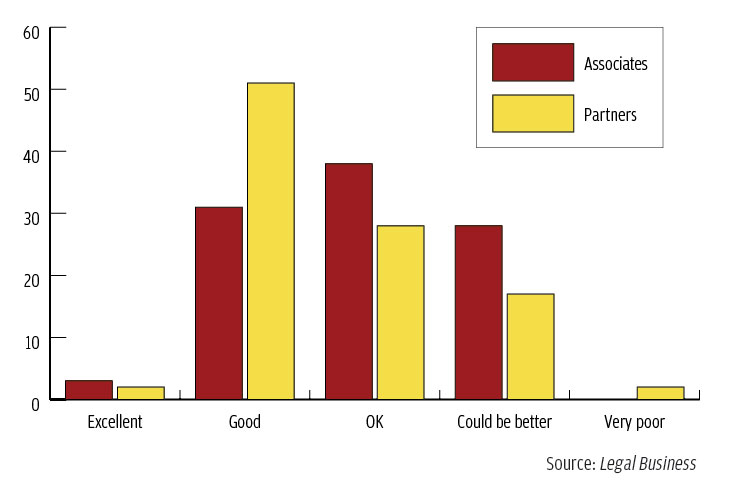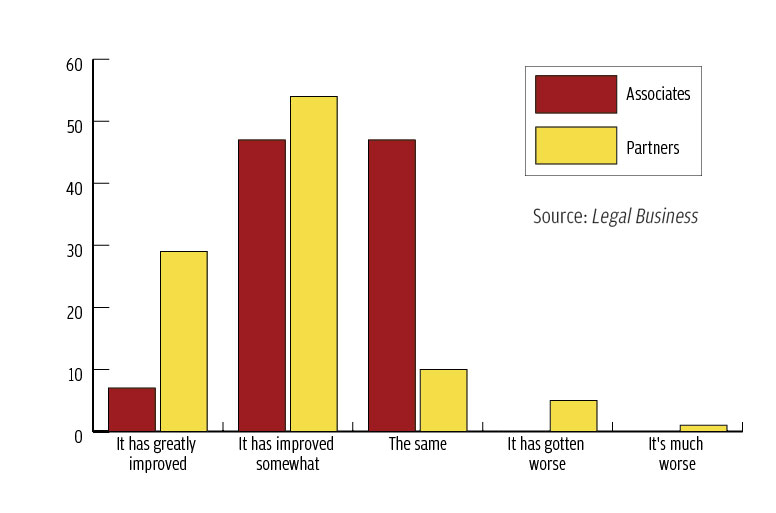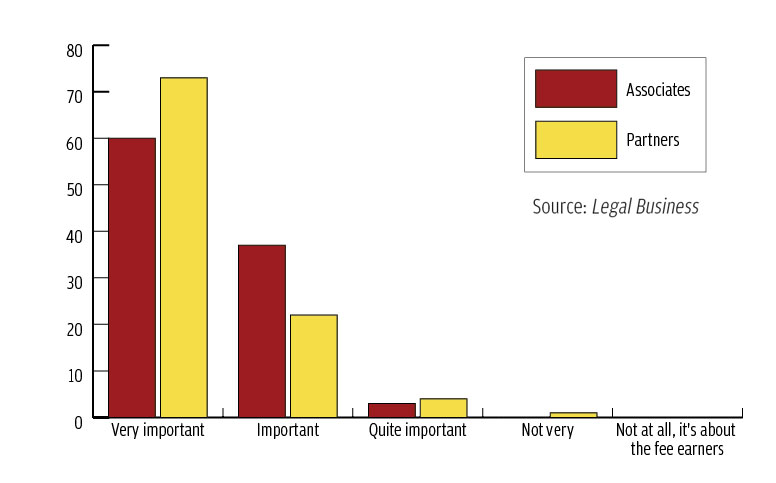There was a time, not that long ago, when running a law firm didn’t require a huge amount of thought. The money came through the front door and the increasing profits went out the back. Clients rarely moved. Partners stayed in one place and, barring a few dishonourable exceptions, law firms rarely failed. Compared to the pressures that their counterparts in other industries faced, law firm leaders had it easy.
‘Looking back to pre-2008, you could say for 30 years it was a relatively benign period for large commercial law firms,’ says David Morley, senior partner at Allen & Overy (A&O). ‘With double-digit growth every year, the biggest worry was how to get enough people to handle the work and to maintain the quality. Now we’re in a very different world. It’s much faster paced and it feels now that the margins for error are much slimmer than they were. If you drift away for a few years because you don’t have an energetic leadership, or you don’t have people connected to what’s going on and who become remote or distant, that can get punished quite quickly now in a way that perhaps wasn’t true seven or eight years ago.’
This has invariably had an impact on the pressures that modern law firm leaders face. The effect that their actions, or inaction, have on their firms can often make the difference between success and failure: since 2008, there have been significant collapses, with Dewey & LeBoeuf, Halliwells and Cobbetts being among the most high-profile examples. In all likelihood there will be more to come and in most cases they won’t be as a result of the market – they will come from a failure of leadership.
‘Of course there will be more firm failures,’ says Bruce MacEwen, president of strategic consultancy firm Adam Smith, Esq. ‘It’s not even an interesting question anymore. Almost without exception, those failures will be unnecessary, in the sense that the firm could have adapted but, frankly, chose not to.’
This raises the question of how some law firm leaders help their law firms adapt and rise above the competition, while others see their firms sink into mediocrity, or worse, oblivion.
There are, of course, few clear answers, but this hasn’t stopped legions of consultancies and business course providers springing up to offer management and strategic guidance to an eager market. For this special report, we surveyed law firm leaders, partners and clients on effective law firm management (see box, ‘Getting better and increasingly important’, below). In addition, we spoke to several leading academics and consultants to hear their views on how law firm leaders should approach the role and how best to initiate change in response to a more demanding and shifting market. Most importantly, we also spoke to six high-achieving law firm leaders – Robert Dell at Latham & Watkins, Morley at A&O, Neville Eisenberg at Berwin Leighton Paisner (BLP), Andrew Leaitherland at DWF, Jonathan Watmough at RPC and Kevin Gold at Mishcon de Reya – to assess how they have managed their respective partnerships and initiated change and innovation.
Reluctant politicians
Because the main asset of a law firm is its people and because partnerships comprise the firm’s shareholders – of which the managing partner is just one – the demands of the leadership role are substantially different to what a chief executive might encounter in a typical corporation.
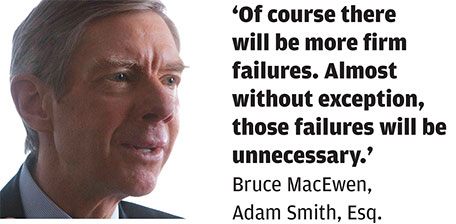
How would you rate the standard of leadership at major law firms currently?
For law firm leaders, it is about getting the balance right between building a sense of direction and consensus, while enabling, preserving and regulating the autonomy that all partners value so much. In achieving this balance, leaders have to become adept politicians, whether they like it or not. This is one of the central arguments made by Empson, who has written extensively on the subject of law firm leadership, most recently in her practitioner report, ‘Reluctant leaders and autonomous followers’. She argues that for a managing or senior partner to succeed, they must be able to fully understand all the informal power dynamics within a law firm, which is so much more than just the official chain of command.
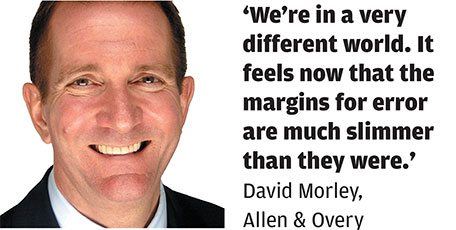
This definition of politics isn’t purely about different factions, departments or offices fighting it out for influence – it also applies to the act of building consensus and getting partners to agree on something. That, argues Empson, is what politics is all about. The paradox is that the law firm leaders that do this best are the ones that falsely appear the most apolitical. Outwardly at least, they must approach the role as if they are stewards or trustees, rather than out-and-out leaders, shepherding the firm from one generation to the next, protecting the culture and leaving the business in a much stronger position than when they took over. The paradox is that this confidence trick has to be combined with genuine trust and integrity.
‘Honesty is the fundamental trait of any good leader – that people know they’re dead straight, don’t talk out of the side of their mouths, don’t have favourites,’ says Jonathan Watmough, managing partner of RPC. ‘You’ve just got to be open and honest with people. Part of the backdrop to that is you have to have a huge degree of humility about you. No-one gave you a crown. It’s a real privilege to be given this train set to play with and it’s something that can be taken away. You have to earn it every day.’
Leadership lessons: Andrew Leaitherland, DWF
From a law firm leader’s perspective, there are some obvious advantages to building a law firm from the ground up, which is practically what Andrew Leaitherland has done since taking charge at DWF in 2006. One particular benefit is the ability to avoid internal factions, a minefield that many law firm leaders have to negotiate if they want to achieve anything.
‘The beauty of going through all this change is each one of your equity partners is part of your hand-picked team,’ says Leaitherland, who was named Management Partner of the Year at the 2014 Legal Business Awards. ‘Whether it’s through a lateral hire or through a merger, you haven’t inherited people you don’t want, you have actually chosen who is going to come into your equity partnership. I have a personal dislike for politics and cliques, so I tend to stamp all over it very quickly and say: “I’m sorry, it’s a one-firm approach here.”’
DWF is a completely different beast from the £34m, two-office Manchester practice that Leaitherland took control of at the age of just 35. Back then, the firm was faced with two choices: ‘We could merge with another firm and be taken over, or we could become a consolidator,’ he recalls. Some of the firm’s older partners favoured the former route, which at the time included a seemingly enticing takeover offer from the now-insolvent Halliwells.
In the other camp, with Leaitherland at the vanguard, were partners who wanted to leverage the firm’s institutional banking and insurance clients and grow a strong firm themselves. ‘We could see the writing on the wall – we weren’t going to retain those panel appointments if we just stayed in the North West,’ he says. ‘We had to grow: I was up for it and the partners were up for it.’
Leaitherland has since led DWF through a period of startling change, the tipping point of which came in a heady period of consolidation in 2012 and 2013, when it took over five different law firms: Newcastle’s Crutes, Midlands-based Buller Jeffries, Scotland’s Biggart Baillie, City-based insurance specialist Fishburns and, in early 2013, the bulk of Cobbetts, which it bought through a pre-pack deal after the firm went into administration. The net result of this is a firm that sits 24th in the Legal Business 100, with a turnover of £191m.
Leaitherland recognises that despite all the effort that went into the various takeovers, one of the biggest challenges has been establishing an identifiable set of values and culture that binds the firm together and isn’t purely dominated by DWF’s legacy employees. This resulted in Leaitherland co-ordinating a programme where the leadership visited each of DWF’s 11 offices to establish how staff wanted the firm to operate. ‘They gave us their feedback on a location-by-location basis,’ says Leaitherland. ‘That creates a really powerful set of cultural values that you can then embed into the business and that becomes part of your DNA.’
Great communicators, quick communicators
In most cases these leaders don’t relish office politics, but they just happen to have a latent political skill for negotiation and achieving compromise between the multiple views and needs that exist within most partnerships. It is this ability that helps them reach a common path.

‘Very rarely do you get disagreement,’ says Andrew Leaitherland, managing partner and chief executive of DWF. ‘Knowing your partners is a key trait, so I know the individuals that are going to have concerns around certain things and I tend to know what their concerns are going to be. So I will try to pre-empt it. I’ll try to have the conversation with them up front and say: “Look, this is going to be coming out in the next 24 hours, I think you’re going to have a worry about this, let’s talk it through now.” Spending that time with that individual to talk through the particular point works a lot better than having a huge debate, which could have been avoided.’
Establishing an open forum in which the partners can discuss everything that needs to be discussed is also vital, even though it might seem time-consuming at the outset.
‘If you have to spend all your time in the partnership asking: “Is this all right? Does this sound okay?” it is incredibly tiring, distracting and time-consuming and it just results in lots of politics,’ adds Watmough. ‘Better to get those discussions out of the way, let everyone have their say, decide together what to do and then just get on with it and refresh the process from time to time. It makes it slow to get started, but ultimately you save a phenomenal amount of time and distraction down the line.’
How do you believe the standards of leadership and governance at major law firms have changed over the last ten years?

‘Listening skills are always important in any leadership role, but especially in law firms because they are slightly more primitive in organisational terms compared to other business models, and it’s really important to listen to what the partnership is saying and to be able to somehow incorporate that into your programme,’ says Neville Eisenberg, managing partner of BLP. ‘Your ability to then prioritise what’s really important for the firm at any given time is critical.’
If you can manage this, then it becomes much easier to act quickly and decisively, although part of the challenge is to know when you should stop listening and act, because indecision can be fatal.
‘Indecisiveness is the downfall of many a managing partner,’ says Leaitherland. ‘You’ve got to have a degree of confidence to enable you to be able to execute your thoughts and your strategy appropriately. You have to have absolute clarity of vision. You’ve got to have credibility with your people. For me that’s all about keeping your promises – if you say you’re going to do something, you do it, because otherwise your credibility suffers.’
Another critical leadership balancing act is making sure that you don’t become so consumed with the management and direction of the firm that you lose touch with the partnership. The law firm leader needs to think big picture, but when it comes to pushing things through they need to recognise their limitations and let others take over the day-to-day management.
‘The critical point is skillset,’ says Watmough. ‘Lawyers have no management training at all, no background in management science. Okay, you can go and do an MBA for a year but you just haven’t got the flying hours in hardcore professional management experience. It’s far better to bring that in, and work alongside and in harness with it.’
‘In an ideal world it is still better to try to find a partner who can lead the firm effectively and then ensure that around that person you have the necessary professional skills to drive things forward,’ says Eisenberg. ‘In bigger firms it is very much a team effort rather than an individual one.’
Recruiting professional managers and then providing them with a degree of legitimacy within the firm is an essential part of this process.
As the firm and the business grows, law firm leaders need to fully empower technical managers, according to Kevin Gold, managing partner of Mishcon de Reya. He comments: ‘There is no doubt that our senior technical directors are regarded as senior partners in the business,’ he says. ‘I surround myself with very high-quality technical managers. My role is to build consensus, to give strategic direction, to deal with the core values and the soul of the business, but I don’t personally have to get involved with technical issues, like work-in-progress management or debt collection, except at critical times.’
Leadership lessons: Robert Dell, Latham & Watkins
While there is no ideal template for how best to run a law firm, Robert Dell’s 20-year tenure as global chair and managing partner of Latham & Watkins isn’t a bad place to start. In a US market that venerates individualism and retains a notable ambivalence regarding the role of leadership in law, the widely admired Latham and Dell truly stand out for blending a highly defined governance structure and counter-intuitive lack of hierarchy with a distinctive culture and a genuine strategic vision. The result has been perhaps the most upwardly mobile global law firm of the last 25 years.
Dell officially hands over the reins to his successor, London-based projects partner Bill Voge, on New Year’s Eve, and a glance at the numbers bears testament to a hugely successful stewardship. When Dell took over in 1994, the US law firm’s annual turnover was $260m and its profits per equity partner were $550,000. Now those figures stand at $2.29bn (making it the world’s third-largest law firm by global revenue) and $2.48m respectively.
Not that Dell is too concerned about the numbers, which to him are a consequence of what he considers his greatest achievement: retaining Latham’s celebrated culture, while expanding the firm by adding 20 new offices over the course of 20 years.
‘Preserving our culture was something we agreed on as a partnership from the beginning and that governed our thinking every step of the way,’ says Dell. ‘We had to pass on a lot of opportunities, which slowed us down a bit, but we felt if we were to dilute our culture, we would be diluting one of our strongest assets. In retrospect, that was probably the smartest thing we ever did and by far the thing I’m most proud of. We’d be a very different – and less attractive – place had we compromised on that.’
Latham’s culture is based on open communication and egalitarianism and by consensus this is one of the few legal institutions that can back up such a claim. For example, the firm’s associate committee is famously powerful and can veto promotions to partnership, while associates can also take part in the interviews of potential lateral hires. Daily firm revenue updates are provided to all partners. Communication and consensus were also critical in getting partner approval that kick-started the firm’s global expansion in 2000. ‘I really tried to make sure that every single one of our partners was given an opportunity to voice concerns and then I’d respond to those concerns,’ says Dell. ‘This couldn’t just be a majority vote. We couldn’t have 40% of our partners opposed to it and move forward even if we had a majority. It had to be our entire partnership and I told the partners that.’
Unsurprisingly, communication has been a key plank of Dell’s leadership style. This was particularly important when it came to tackling the global financial downturn, by far the biggest challenge he has faced as a leader, which saw the firm in 2009 announce 440 job losses.
‘We were particularly hard hit because some of our strongest practice areas were right at the centre [of the crisis] and two of our top-five clients were Lehman Brothers and Bear Stearns, who disappeared overnight,’ he says. ‘In those circumstances, you invariably have a partnership that is anywhere on the spectrum from concerned to stunned, so there was a need to communicate regularly and effectively with them, to explain how we were being impacted and what we were going to do. We went into a crisis-control mode and had much more regular discussions with our partners, putting together a plan, and it held everyone together.’
Dell’s current challenge is figuring out what he’s going to do once he’s retired, which has included long conversations with other retired law firm leaders. ‘One person told me it took him about a year until he knew what he wanted to do,’ says Dell. ‘If there was a theme, it was that you’re not going to know how you feel until you’ve stopped.’
The long-term view
Surrounded by a solid management team, leaders will also be freed up to get to know the firm’s clients, communicate plans to the partnership and engage in the kind of future-gazing that the everyday grind typically precludes among fee-earning partners.

‘I see in the City, and not just in the law, an awful lot of short-term behaviour and activity and the counterpoint to that is the ability to think and act very long term,’ says Watmough. ‘But you can only do that if you have the self confidence and stability to say: “I’m going to do something today that is going to cost a lot of money now and it isn’t going to pay off for three years.”’
Getting better and increasingly important – The coalface view on law firm leadership
Law firm clients clearly want to see more innovation from their legal service providers, and law firm leaders recognise that innovation is crucial if they want to provide a better-value service to their clients and stay ahead of their competitors. Leaders also know it is their responsibility to foster a culture within their law firms that rewards innovation from the ground up.
But what about the lawyers themselves? We surveyed the market and received responses from over 300 partners and around 100 associates. Comparing the two groups, the notable difference is that there is more partner buy-in when it comes to the quality of leadership. Both partners and associates agree unequivocally that strong leadership is important to major law firms, but while 83% of the partners surveyed believe that the standard of leadership has improved over the last ten years, only 53% of the associates agreed and the remainder felt it had stayed the same.
The results also suggest that associates feel that they do, or at the very least should, play a greater role in pushing forward innovation. The majority of all associates agreed on the importance of central management in fostering innovation, but 41% of associates felt it was a balance between leadership from the top and grass-roots initiatives. In the case of partners, a much smaller proportion (34%) agreed with this sentiment. Forty-five percent of associates felt partnership was a block to innovation. Partners were less self-critical, with just 28% agreeing that a partnership is not compatible with a culture of innovation.
If anything, these results underline the fact that there is an increasing generational disconnect, highlighted in ‘The partnership dilemma’. If partnership is to become a business model that promotes innovation, and an attractive career option, it is something that far-sighted leaders need to address now.
That there will be a higher level of antipathy from associates as to the effectiveness of the partnership model and, by extension, the ability of law firm leaders to effect change and encourage innovation, is a given. But this is also reflected in predictions for the future of the industry. While 89% of partners and 82% of associates recognise that the legal industry – and major legal service providers – will change to a considerable extent over the next ten to 15 years, nearly a quarter of partners feel that the profession will change beyond recognition. In contrast, just 10% of associates feel the same way. While a logical conclusion to draw from this disparity is that partners are far enough removed from the coalface to take a more holistic view of the industry, it also suggests that law firm leaders may need to take a more robust approach to getting Generation Y on board with change.
How important is strong leadership to a major law firm?

While this approach has paid dividends long term at Latham, in reality each law firm leader has to take account of the extent to which their firm is a partnership or pseudo-partnership and tailor their approach appropriately. A more centralised style can deliver for some law firms, providing it delivers clear results, but most partnerships will chafe if a leader suddenly tries to impose a top-down style. And obviously, the sheer size of modern international law firms makes cultivating the partnership more challenging by the year.
‘When I started, I recall thinking that my big driver is getting the best of people and that remains very much true today,’ says Leaitherland. ‘I see my role largely as taking away obstacles that prevent people from achieving their potential.’
This doesn’t just come from fostering change (see ‘The partnership dilemma’), but also the basic task of massaging partner egos because, as Empson puts it, law firms have ‘a lot of quite insecure individuals with high recognition needs’.
Unfortunately, for leaders who tick all of these boxes, the likelihood that any ego massages will be reciprocated is slim, which leads to the final key psychological requirement of any successful law firm leader: possession of a very thick skin, because gratitude rarely comes with the territory.
‘You have to be pretty resilient because you don’t get a huge amount of positive feedback,’ says Eisenberg. ‘If the firm does well, it’s because the partners are amazing. If the firm does badly, it’s because the management is useless.’
Leadership and innovation reflections from the top
What makes an effective leader?
‘These days adaptability is critical. Whatever worked a year or two ago doesn’t necessarily work for the next couple of years. One has to be prepared to adapt one’s thinking a lot, almost in real time.’
Neville Eisenberg, Berwin Leighton Paisner
‘People take communication for granted, but if two thirds of my time is spent making decisions, at least a third is spend communicating them. A decision is useless unless it’s been effectively communicated. Communicating with 5,000 people in the firm in 30 different countries at all sorts of different levels is a skill and you need to learn that.’
David Morley, Allen & Overy
‘Approachability [is important]. What I can’t stand is MPs that put themselves in great big corner offices and hold themselves out on a huge pedestal. I don’t have an office. I’ll wander around and use any available desk.’
Andrew Leaitherland, DWF
‘Ninety nine percent of it you learn on the job. The really big challenge is taking the time to learn something entirely new, because it is entirely new. It really is about flying hours and experience, and taking your time and figuring out what works.’
Jonathan Watmough, RPC
The role of a law firm leader
‘It’s about being able to build a consensus and act decisively to move the firm forward. It’s about creating a vision of where the firm is going. Conveying to the firm a sense of direction and purpose.’
David Morley
‘My general style is to try to build a consensus and we’ve been fairly effective at that. I can think of one or two times where I’ve gone against the tide, but it’s literally once or twice.’
Kevin Gold, Mishcon de Reya
The importance of culture
‘How do we build a consistent culture? We’re very picky about who we bring in. I don’t care how good they are or how dazzling they are with clients, if they’re not going to be able to fit into our culture, we won’t hire them. [But] ultimately culture is something that has to be dynamic. It has to change with the times and the changing needs of your clients and business.’
David Morley
‘What happens with values when you live and breathe them as an organisation is that they become like a Bill of Rights.’
Kevin Gold
Future challenges for leaders
‘For most firms, the last six years have been about keeping heads above water and staying in the game, whereas the pressure to really change is now going to increase significantly as the new business model starts to emerge. That impetus to innovate and change will really pick up speed over the next two to four years, perhaps even sooner and faster.’
Jonathan Watmough
‘[When law firms fail] in most cases it’s not the market, but a failure of leadership.’
David Morley
Leadership’s role in supporting innovation
‘We spend our lives in a state of paranoid contentment. We’re never quite comfortable and we’re always looking to innovate.’
Kevin Gold
‘What’s driving innovation? It’s just the increased level of competition. It’s the degree of competition and it’s the increased sophistication of most of our clients as buyers of legal services.’
David Morley
The future of partnership
‘If the way law firms are managed does not move in the direction of the way companies and other businesses are managed, it’s going to become unmanageable.’
Neville Eisenberg
‘The partnership structure has a lot to commend it. One thing that is often overlooked is that there’s been a lot of scandals in the corporate world: abuse of power and the so-called agency problem where you’ve got a mismatch between the interests of the shareholders and the management. In a partnership structure we’re completely aligned. Most of my shareholders are on the premises – they go up and down in the lift with me.’
David Morley
‘Lawyers think that what they do is absolutely unique, when about 80% of what anyone does can actually be replicated by technology. These are all realities that people are going to have to face.’
Kevin Gold
For the full Insight report, please see: ‘The partnership dilemma’ in Legal Business

